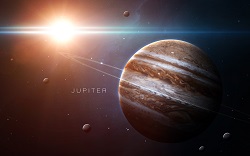Irish schools to gain a window to Jupiter with radio telescopes
Planetary science is a rapidly growing field of scientific research that involves the scientific study of planets, moons and planetary systems, and the processes that form them. Europe plays a leading role in this exciting scientific sphere, boasting one of the biggest communities of planetary scientists in the world: 800 tenured academics and 4 000 or so young researchers scattered across hundreds of research institutions. However, without a common supporting body, Europe’s scientific community has been largely fragmented. Since its foundation in 2005, the Europlanet Consortium has linked research institutions and companies active in planetary research in Europe and around the world. It’s succeeding in creating significant cohesion among Europe’s planetary scientists. Aiming to build on its achievements, in 2015 the consortium launched its project EPN2020-RI, funded for the most part by the EU. With 33 project partners from 19 European countries and over 150 participating individuals, the project has worked to create cooperation and effective synergies between its different components: space exploration, ground-based observations, laboratory and field experiments, numerical modelling and technology. EPN2020-RI’s active outreach and dissemination programme has sought to engage European citizens with planetary science and inspire the next generation of physicists and engineers. Through the 2018 round of Europlanet’s Outreach Funding Scheme, the project will be providing funding to rural secondary schools in Connacht, Ireland. The funds will be used to support the Connacht Schools Planetary Radio Telescope Network, which will observe the atmosphere of the planet Jupiter as part of a wider NASA research programme monitoring the gas giant’s active magnetosphere. Radio telescopes unlock Jupiter mysteries for students, teachers With the funds awarded, eight schools in the counties of Galway, Mayo and Roscommon will have a dipole antenna radio telescope installed on their grounds. The 6-metre-long and 3-metre-high radio telescopes that resemble washing lines will allow teachers and students to observe Jupiter’s polar regions. Here, the planet’s versions of the aurora can be found. “Practical activities in astronomy have great potential for inspiring school students in Science, Technology, Engineering and Maths (STEM) subjects,” says project leader Dr Aaron Golden from the National University of Ireland (NUI) Galway, in a news item(opens in new window) posted on the Irish Tech News website. “However, there are limited opportunities due to the need for specialised equipment and facilities, to work at unsocial hours and, of course, clear skies, certainly for optical astronomy. Radio astronomy offers a very cost-effective alternative for teachers and students to participate in actual observations of radio-bright objects such as the Sun and the planet Jupiter, and be able to participate in the wider astronomical community’s study of this most fascinating of the solar system’s planets.” The low population densities around these rural schools will help to limit radio frequency interference in the telescopes’ operation. Furthermore, the telescopes’ automated nature will make observations possible despite typical Irish weather conditions. Observations from each school will be fed in real time to a server at NUI Galway. The Connacht project will be formally launched at the 2018 European Planetary Science Congress in Berlin this September. It’s just one of the actions taken via the EPN2020-RI (EUROPLANET 2020 Research Infrastructure) project to build a truly pan-European community that shares common goals, facilities, personnel and data across national boundaries. For more information, please see: EPN2020-RI project website(opens in new window)
Countries
United Kingdom



